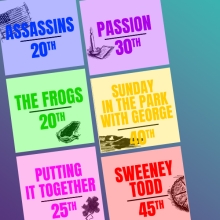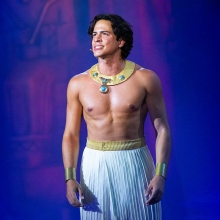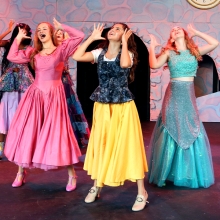On Wednesday, November 27th, the MTI office will close early at 1 PM ET for the Thanksgiving holiday weekend. Office operations will resume on Monday, December 2nd.
Filichia Features: A Toast To The Thespian Audience
Filichia Features: A Toast To The Thespian Audience

While I was in Lincoln, Nebraska between mainstage shows at The Thespian Festival, I had enough free time to mosey over to the Howell Theatre to see a cutting of Smokey Joe’s Café. Maybe this time I’d discover its magic.
Oh, am I glad I did. Not because I liked the show any better – I didn’t – but because of the way the teenagers that made up more than 90% of the audience responded to it.
During one song when a boy was crooning to a girl, there was unbeknownst to him another boy who came up behind him and tenderly touched his back. The singer assumed that another girl was interested in him and turned around with a smile ready to greet this new admirer – only to change that smile to a snarlish dirty look when he discovered that the devotee was a male.
And while the director meant this to be funny, no one in the audience laughed. Not one. The hundreds of teenagers in attendance wouldn’t dignify the so-called joke that a boy would be repulsed by another boy’s admiration. They’re well beyond finding that amusing.
All right, you say, they’re sensitive to gay issues because many of them are gay or suspect that they might be. Perhaps, perhaps. But then in the “Dance with Me” sequence, after the director had brought on his best-looking kids, in came a gawky girl wearing eyeglasses that had been white-taped in the middle to keep them together. She frantically went from uninterested boy to uninterested boy begging “Dance with Me!” in hopes of finding someone, anyone, who would pair up with the likes of unattractive her.
And while this too was supposed to be a funny, again no one laughed. Some teens, be they female or male, identified with the girl who came to the dance with high hopes, found no takers and went home horribly depressed. They’ve been there themselves.
There’s always a lot of talk given by the pros about “audience development.” Well, there was plenty of it here in Lincoln and – more to the point – plenty of development that’s already occurred because they’ve attended one, two or more Thespian Festivals during their high school careers, and have seen plenty of other productions in schools, community theaters, touring houses and perhaps even Broadway.
They were really into the productions here. In White Christmas, there’s a laconic handyman named Ezekiel Foster. How laconic? The joke is that he only says “Yep” when spoken to, no matter what the questioner asks him. As he exited after having said the word four or five times, he received a barrage of applause and cheers as if he had just delivered “Betrayed” from The Producers. This audience truly understands that there are indeed small parts, but they needn’t have small actors in them.
Are they loud? Sure, but no louder than the so-called adults who are in the audiences of The Tonight Show or Jimmy Kimmel.
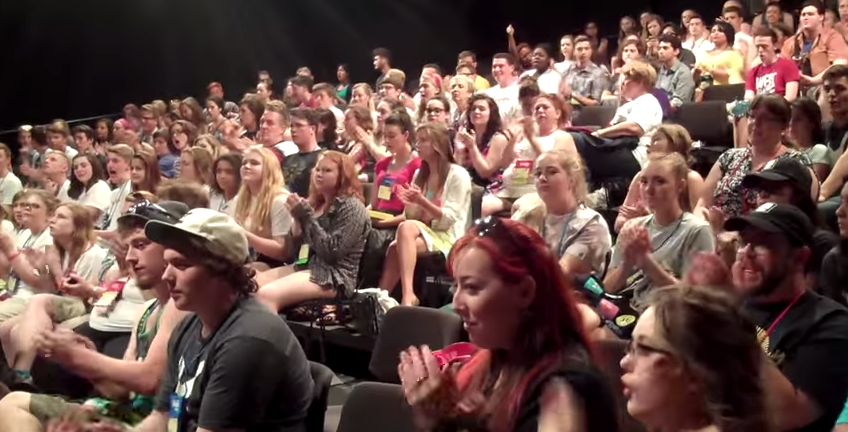 The Audience of The Festival's Got Talent, Talent Show at the 2015 International Thespian Festival.
The Audience of The Festival's Got Talent, Talent Show at the 2015 International Thespian Festival.
Everyone’s appreciated at the festival – even the men who lug on some black covering to drape over the podium after all the orators have finished their speeches. All right, the applause is purposely overdone; no one really thinks that what these men are doing is so heroic. Still, they want to show appreciation for every part of the festival, and these guys qualify.
So imagine what happened when the kids saw riveting performances. While I didn’t see every show here, I can report that the student actor who got the most titanic reaction from two separate crowds was a young man who had scored mightily last year. Check out my column from July 18, 2014 and see just how well he did in an audition class.
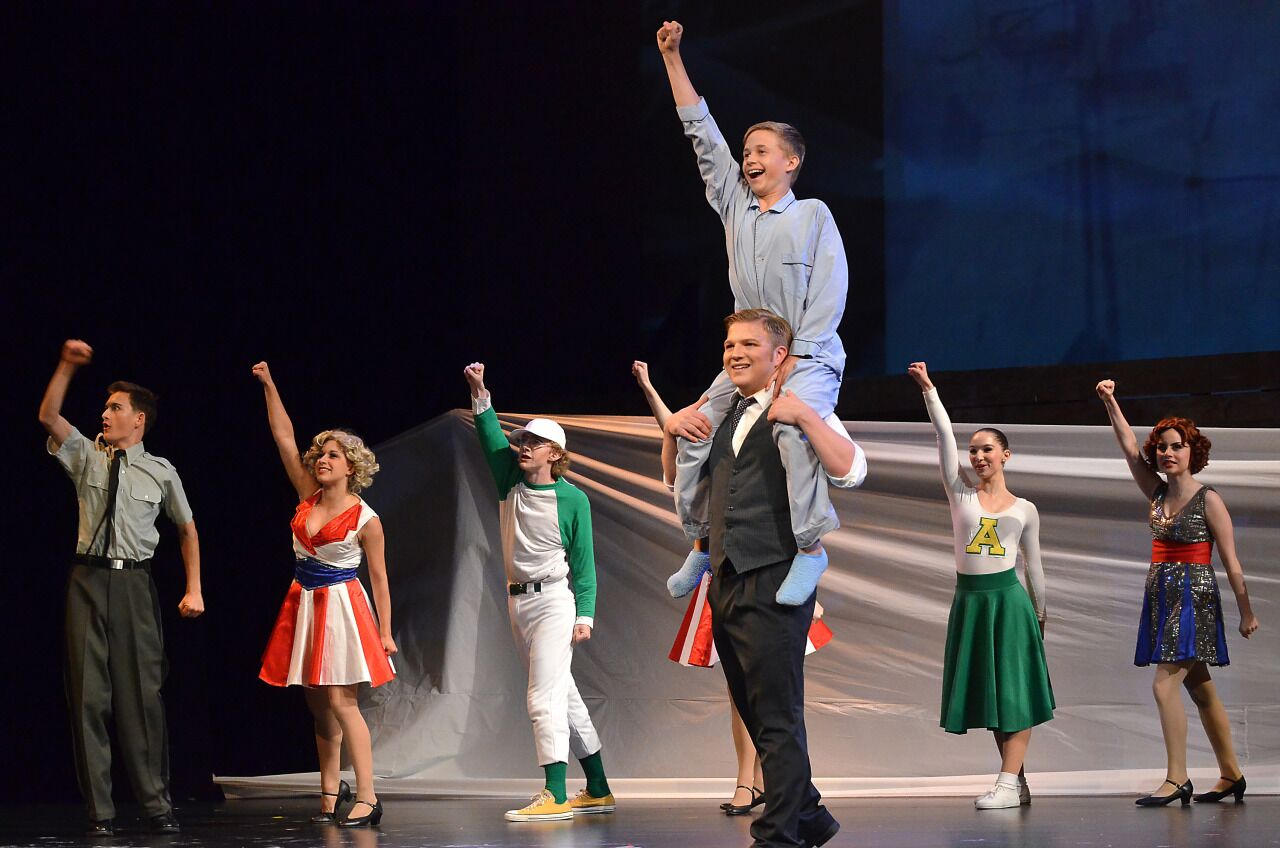 Alex Stone and Ensemble at the 2015 International Thespian Festival. (Photo © R. Bruhn)
Alex Stone and Ensemble at the 2015 International Thespian Festival. (Photo © R. Bruhn)
But now Alex Stone was starring in Big Fish, portraying Edward Bloom, which Norbert Leo Butz played on Broadway two years ago. Truth to tell, when I saw Butz do it, the role didn’t seem all that dynamic or all-encompassing to me. It took Stone, under Amy Poe’s sterling direction, to show me what a powerhouse part it is.
Given that the show deals with a son who starts to question the truth behind his father’s many stories, the day may come when Alex Stone’s own son will doubt his daddy’s recollection of how he triumphed at The 2015 Thespian Festival. I hope I’ll still be around to verify Stone’s every claim.
He can deftly move from dialogue to song and offer a hands-in-pocket ease when his character is actually scared. Stone can even do swordplay with the requisite panache. In the scene where he was an ill old man, he was convincing, but what impressed me more was that when the scene ended and the lights blacked out, he was still walking into the wings as if he had sickness in his every bone.
Stone got the crowd on his side extraordinarily fast. During the opening song, he clapped his hands a few times in rhythm so forcefully that the audience found him charismatic enough to join him. Understand that Stone didn’t come down to the lip of the stage, stare down the audience, put his hands high above his head, give a curt nod and start clapping – the universal symbol for “It’s time you clap along, people” as is often seen in rock concerts. The audience just joined him because it was moved to do so.
As I say, they’re smart kids. When Big Fish’s plot had a young Edward Bloom traveling to Alabama to the school where the redheaded love of his life would be attending, he arrived and noted that “There are lots of redheads at this school -- and that makes sense” as he tapped the sign that said “Auburn University.” At each of the two performances, the teens immediately laughed. They didn’t need a few seconds for the joke to register; what’s more, their response showed that they were paying rapt attention. All audiences should be as much on the ball.
Oh, admittedly they can be silly. Whenever a boy and girl kiss, most of them let out a salacious "Oooooooooooh!" On the other hand, an all-puppet Pyramus and Thisbe at the Howell got a sympathetic "Awwwwwwwww" when an unfortunate fate met the characters.
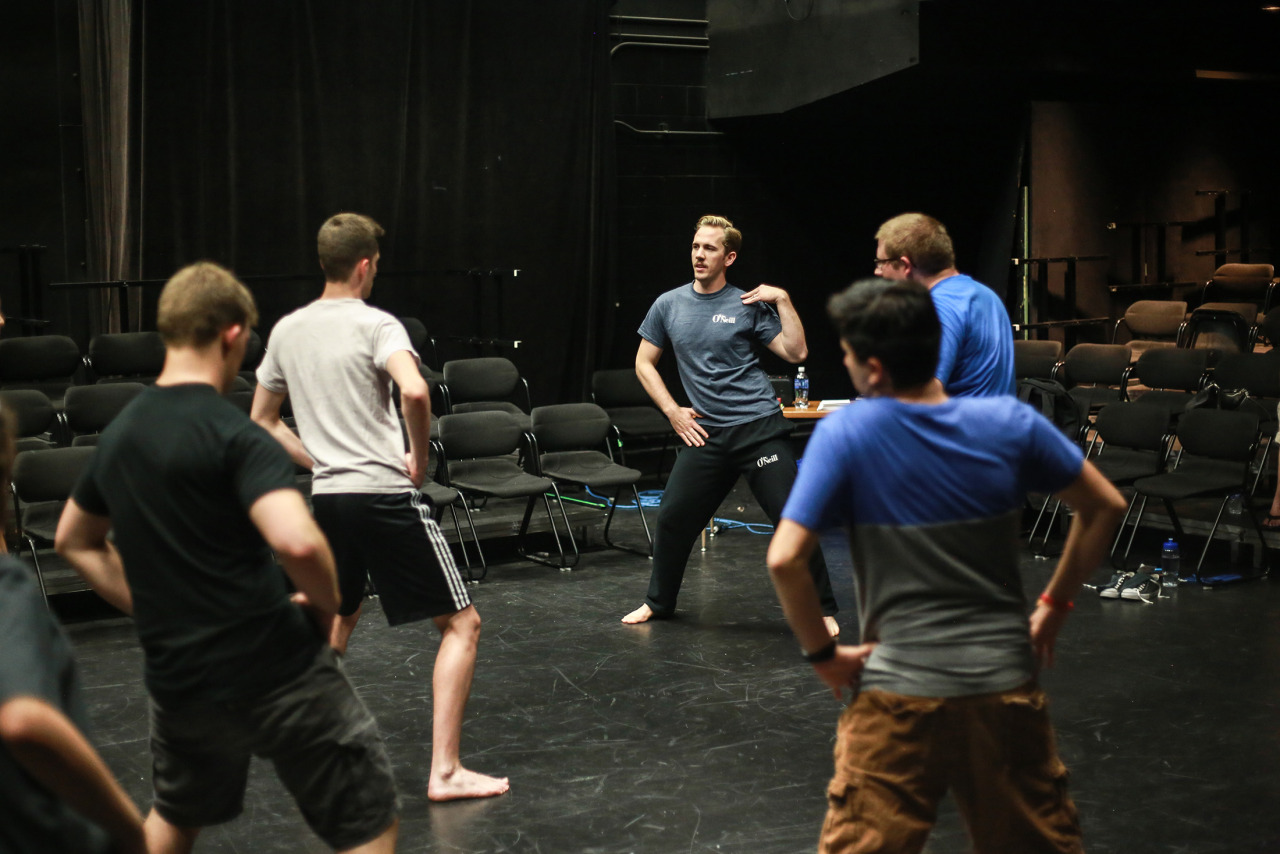 A movement workshop at the 2015 International Thespian Festival.
A movement workshop at the 2015 International Thespian Festival.
At the nearby Carson Theatre, John Olive’s Minnesota Moon told of two longtime friends who are now of age to drink and are taking advantage of it. Larry is a gas station attendant while Al is college-bound, thanks to a scholarship. After Larry took a long swig, he announced "All I want to do is keep doing what I'm doing," which made the teen theatergoers laugh in surprise at his narrow scope. The Thespians want and expect more for themselves, and plays and festivals are helping them to get it.
So were workshops, of which there were dozens. Sarah Mitchel, teaching “Getting the Most out of Your Musical Theater Audition,” told her class “We all know the number we’ve seen on stage – and we have to let that go. You have to be you and perform it your way.”
The assembled feverishly took notes when Mitchel’s advice poured forth. (“When I sing a song that has a question in it, I act as if I’m expecting an answer” … “Have one book with songs you’re comfortable with and another book of songs you’re working on.”)
As a boy sang “Giants in the Sky” from Into The Woods, Mitchel came behind him and pinned back his arms with the authority of a cop who’s arresting a suspect – for the lad was overdoing the gestures.
When one girl said she’d sing a capella, Mitchel cautioned that “You may be making it harder for yourself, but it is a good exercise.” After a young man sang “Trapped” from The Addams Family, Mitchel pointed out that “When you have a list song, you have to build it and not make it sound like a broken record” (which made me wonder if these members of the iTunes generation understood the simile).
Whatever the case, watching the kids improve from their first attempt to their second in fewer than five minutes was a marvelous experience. As one girl noted of the “Giants in the Sky” singer, “The first time you came across as pretending to be excited but the second time you really seemed excited.”
At Kathy Morath’s workshop “Improvisation Techniques for Singing Actors,” she told her class that “Even how you say your name when you’re about to audition is important. Find the rhythm in your name. Notice that ‘Angela Lansbury’ has both alliteration and assonance.”
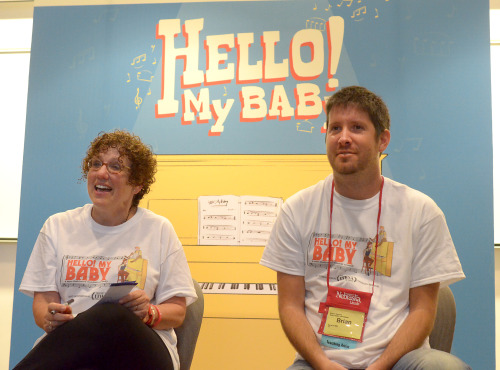 Creator of HELLO! MY BABY, Cheri Steinkellner and a teaching artist during a workshop at the 2015 International Thespian Festival.
Creator of HELLO! MY BABY, Cheri Steinkellner and a teaching artist during a workshop at the 2015 International Thespian Festival.No kid looked at another as if to say “What’s ‘alliteration’?” or “Have YOU heard of ‘assonance’?” These are familiar terms, for as statistic after statistic has shown, kids who are interested in theater tend to be the brightest ones who therefore do well in other subjects, too.
Morath asked them to say their names in a musical fashion, and some even did little dances as they sang. Lesser mortals would have said “This is stooo-pid,” but these kids have the openness and enthusiasm that will serve them well.
Similarly, there was no rolling of eyes or whooshing sounds of frustration when Morath had the kids simply walking around the room. They trusted that she had a worthwhile exercise for them. How they smiled when she suddenly said “You’re late for an audition for Steven Spielberg!” They got the point and started walking as quickly as possible until she told them “You’re at the funeral in Our Town” – and then they began walking mournfully slow. Nothing was questioned; they were willing to believe that if the Thespian Festival powers-that-be believed in Morath, they would, too.
Maybe the answer is to start them young. Teresa DeBerry, a teacher at the Garden Hills Elementary School in Atlanta, has for the last twenty-one years directed her second-through-fifth graders in fifty-five minute versions of Shakespeare – yes, THAT Shakespeare. Granted, her most recent offering, The Merry Wives of Windsor, doesn’t show mankind at its best, what with Falstaff cavorting. But the intense way that she spoke led me to believe that the kids got a great deal out of it.
The Lied Center is mammoth, but with four thousand people running around, someone’s bound to get in someone’s way. And yet, whenever a kid stepped in front of me too quickly, he or she always – I mean ALWAYS – turned and said an embarrassed and heartfelt “Excuse me.” This must have happened thirty times during the week.
Similarly speaking, when I was walking down the street and a boy or girl was approaching from the other direction, far more often than not the kid offered a smile and a “Hello!” even though the kid didn’t know me at all. Adults aren’t enemies here, but people to be respected and cherished, for who knows what wisdom they’ll dispense if given the chance.
Nothing against Corny Collins or the lads and lasses who once appeared on his Baltimore TV show, but I’ll match his “nicest kids in town” with these kids any day. What their exemplary behavior indicates (and may even prove) is that being involved in the arts brings out the best in kids.
But we’ve known that all along. What a shame that our nation has so many people in power who don’t understand that.
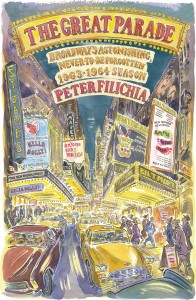
You may e-mail Peter at pfilichia@aol.com. Check out his weekly column each Monday at www.broadwayselect.com, Tuesday at www.masterworksbroadway.com and Friday atwww.kritzerland.com. His book The Great Parade: Broadway’s Astonishing, Never-To-Be Forgotten 1963-1964 Season is now available at www.amazon.com.





















